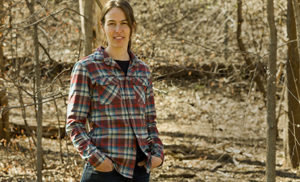 Free Forest School Executive Director Anna Sharratt said, “This idea started as an outdoor play group. It has turned into a river I’ve been riding for several years now.” (Photo by Margie O’Loughlin)[/caption]
Free Forest School Executive Director Anna Sharratt said, “This idea started as an outdoor play group. It has turned into a river I’ve been riding for several years now.” (Photo by Margie O’Loughlin)[/caption]
Let them be kids, outdoors. Let them learn through unstructured play in nature.
That’s the cornerstone belief of Free Forest School, a volunteer-led program that operates in 200+ cities across the country.
Right now, their weekly outdoor gatherings are, of course, suspended, but it's easy to put the principles of Free Forest School to use during this extended break from school.
Longfellow resident Anna Sharratt developed the idea for the program five years ago, when her young family lived in Brooklyn, N.Y. She and her husband had signed their four-year-old up for a pre-K learning program, and the kids didn’t set foot outdoors for a whole month.
Sharratt, who grew up alongside Minnehaha Creek and camping in the BWCA, was stunned. She said, “In my way of thinking, learning and nature are inseparable. I had hoped to meet other families in the neighborhood, thinking we could get together outside of school, chill out, and play. I found parenting in New York City to be very competitive. The idea for Free Forest School grew out of that longing for non-competitive, quality time spent outdoors with other families.”
Two months after Sharratt started the first chapter of Free Forest School in Brooklyn, her family moved to Austin, Texas. Once seeds were planted in those two places, people started contacting her from around the country asking, “How can I start this up in my town?”
“There is no such thing
as bad weather,
only bad clothing.”
~ Scandinavian saying
Focus on supportive communities for parents and kids
The Free Forest School model is straight forward; it focuses on creating supportive communities. Parents can parent in different ways while encouraging child-led, unstructured play.
Sharratt said, “There are so many people who attend our play groups. Adults say they forge a deeper relationship with their kids through unstructured play, because so many of their usual power struggles disappear. There is less adult talking and explaining, there are fewer rules.”
The suggested age range for children is 0-6 years, but the majority of kids are 1-4. Every Free Forest School chapter has a director. It’s that person’s job to recruit parent facilitators from the community and to train them.
One of the ongoing Minneapolis sites is Theodore Wirth Park, where a Free Forest School chapter has met on Monday mornings at a certain trailhead for the past four years.
Sharratt explained, “We have a strong emphasis on place-based learning, so we go back to the same place throughout the seasons. Kids love to explore in the rain and mud of April, the heat and humidity of June, the snow and ice of January.”
Place-based learning might come as something of a relief during this time of staying at home, or close to home. According to Sharratt, young children are just as happy, maybe happier, going back to the same place over and over again.
Now that even playgrounds are closed or discouraged, here’s the best news yet. Find a scrappy patch of woods near your house; any nearby nature spot will do. Take the kids there and, after making sure it’s reasonably safe, led them take the lead in their own unstructured play.
Sharratt encourages parents to think back to their own memories of childhood, asking, “What places in nature were most meaningful for you? It’s probably not the trip your whole family took to a national park, though it could be. It’s more likely a tree you loved to climb by yourself, or a vacant neighborhood lot where you built a fort with your friends. These are experiences that give kids a sense of autonomy, which is especially important in this time of ‘helicopter parenting.’”
“Kids are hard wired to learn through play in nature, but parents can get in the way with too much structure and over-scheduling.” ~ Anna Sharratt
Every day outside
It is unlikely that Free Forest School playgroups will be meeting this summer, given the current health emergency.
In the meantime, the website is resource rich, and includes a COVID-19 inspired initiative called Every Day Outside on the blog. It’s a place to share ideas, play prompts, inspirations, and ideas for child-led activities. There are also weekly emails that dive deeper into the value of unstructured play for the whole family. For more information, visit www.freeforestschool.org or or email info@freeforestschool.org.
“It may look like we’re educating children, but we’re really educating adults,” said Sharratt. “Kids are hard wired to learn through play in nature, but parents can get in the way with too much structure and over-scheduling.”
So, even though Free Forest School isn’t formally meeting right now, Sharratt said the emphasis hasn’t changed one bit. Today is the perfect day to get outside with your kids. Let them cross a stream on rocks or climb a tree. They might look like they’re “just playing,” (and what’s wrong with that?) but they’re also developing their sense of spatial awareness, large and small motor skills, balance, critical thinking, and much more.
In a nutshell
Free Forest School ignites children’s innate capacity to learn through unstructured play in nature, fostering healthy development and nurturing the next generation of creative thinkers, collaborative leaders, and environmental stewards.
Comments
No comments on this item Please log in to comment by clicking here